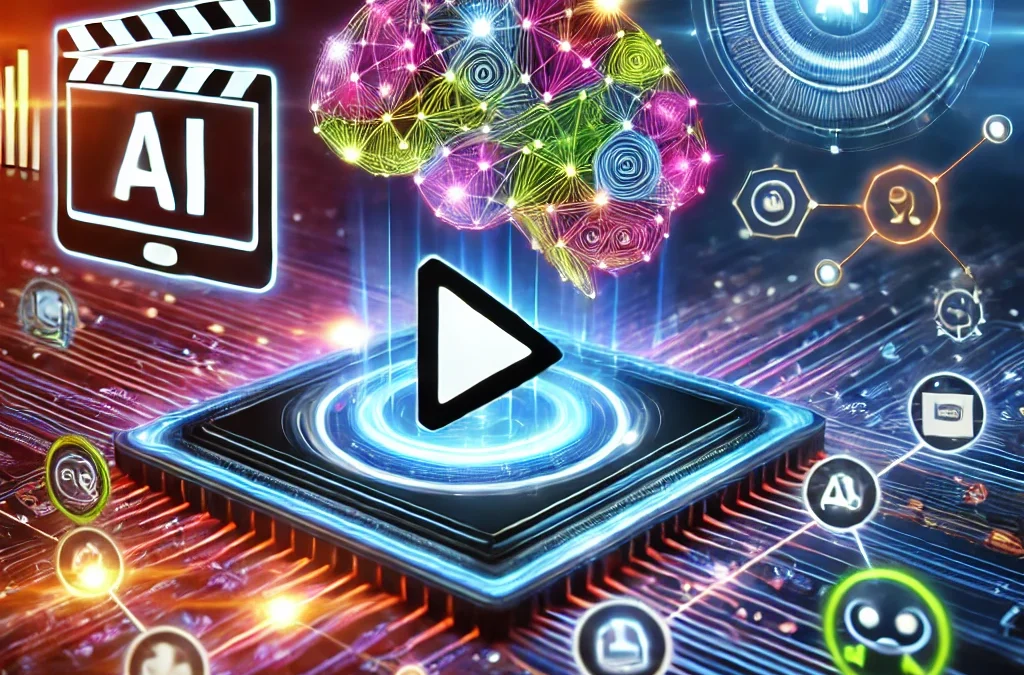AI and Video Marketing: Revolutionizing Visual Content for Greater Impact
As digital content evolves, video marketing has proven to be one of the most powerful tools for engaging audiences and building brand loyalty. However, the demand for high-quality, impactful video content can be challenging for businesses to maintain consistently. This is where Artificial Intelligence (AI) is stepping in to transform video marketing. From automating video editing to predicting audience preferences, AI is reshaping how video content is created, optimized, and consumed.
In this in-depth article, we’ll explore how AI is revolutionizing video marketing and how businesses can leverage these advancements for greater impact.
1. AI-Powered Video Creation and Editing
AI is enabling faster, more efficient video production by automating tasks that previously required significant time and expertise. This allows businesses to create high-quality videos at scale without a massive investment in resources.
Key Applications:
- Automated Video Editing: AI-driven tools like Magisto and Animoto use machine learning algorithms to automate video editing. These tools analyze raw footage, choose the best segments, add transitions, and even apply music or text overlays, transforming hours of work into minutes.
- Smart Scene Detection: AI can recognize and segment scenes in a video based on visuals, audio cues, and patterns. This is especially useful for creating highlight reels, shorter video cuts, or teasers that capture the most engaging moments.
- Content Creation Tools: AI-powered platforms like Pictory and Lumen5 allow businesses to turn written content into short video clips. By automatically generating visuals, text animations, and soundtracks, these tools make it easier to create videos without extensive editing skills.
Impact: Automated editing and creation save time and make it possible for businesses to produce professional videos quickly, enabling them to keep up with the increasing demand for video content.
2. Personalized Video Content for Enhanced Engagement
One of AI’s most transformative applications in video marketing is its ability to personalize content. By analyzing user data and viewing behaviors, AI algorithms can create video experiences tailored to individual preferences, increasing engagement and building stronger connections with audiences.
Key Applications:
- Dynamic Video Personalization: AI enables companies to tailor videos for individual viewers by inserting personalized text, images, or other elements based on viewer data (e.g., name, location, purchase history). This technique is especially effective in email marketing and customer outreach, as personalized content increases click-through rates.
- Predictive Content Recommendations: AI-powered recommendation engines, similar to those used by Netflix or YouTube, suggest videos based on a viewer’s previous interactions, search history, and interests. Businesses can integrate similar algorithms on their platforms to keep users engaged longer.
- Audience Segmentation for Customization: AI can segment audiences based on viewing preferences, demographics, and behavior. This allows marketers to create different versions of video content for each segment, ensuring that messaging resonates with various audience groups.
Impact: Personalization boosts engagement by making viewers feel valued, leading to higher watch times, improved retention, and stronger customer loyalty.
3. AI-Enhanced Video Analytics for Data-Driven Strategies
AI-powered analytics tools provide valuable insights into how video content is performing and how audiences are interacting with it. These insights allow marketers to fine-tune their strategies based on data, leading to more effective campaigns and higher ROI.
Key Applications:
- Real-Time Video Analytics: AI tools can track metrics like watch time, drop-off points, replays, and engagement rates in real time. This allows marketers to see how viewers interact with content as it’s happening and make immediate adjustments if needed.
- Sentiment Analysis: AI can analyze viewer comments, likes, and shares to gauge sentiment and emotional responses to videos. This helps marketers understand what resonates with audiences on an emotional level, improving the emotional impact of future videos.
- Predictive Performance: By analyzing data from previous campaigns, AI can predict how new video content will perform. Marketers can use these insights to decide which types of videos to invest in and how to allocate their budgets more effectively.
Impact: AI-driven analytics provide data-driven insights that help businesses understand their audience better, create content that resonates, and improve the ROI of video marketing campaigns.
4. AI-Driven Optimization for SEO and Discoverability
AI tools are not only improving content creation but also making it easier for video content to be discovered by target audiences. AI-driven optimization can enhance video SEO, ensuring that videos rank higher in search engines and reach a wider audience.
Key Applications:
- Automatic Transcriptions and Captions: AI can automatically transcribe videos and generate captions, making videos more accessible to a wider audience. Captions improve video SEO by allowing search engines to index the text content, leading to higher visibility in search results.
- Keyword and Hashtag Recommendations: AI-powered platforms like TubeBuddy and VidIQ analyze trending keywords and hashtags in real time, suggesting the best options for titles, descriptions, and tags. These recommendations help marketers optimize videos for search engines and social media platforms.
- Thumbnails and Titles Optimization: AI can analyze viewer preferences to determine which types of thumbnails and titles get the most clicks. Based on this data, AI tools can recommend the best thumbnails and titles to maximize engagement.
Impact: Optimizing video content for search improves discoverability, driving more organic traffic and ensuring that video marketing efforts reach a broader audience.
5. Real-Time Interactivity and Live Streaming with AI
Live streaming has become an essential part of video marketing, and AI is enhancing the live streaming experience by enabling real-time interactivity and personalized engagement.
Key Applications:
- Automated Moderation: AI can monitor live chat interactions, automatically filtering out spam or offensive comments. This creates a safer environment and allows hosts to focus on delivering content without distractions.
- Real-Time Polls and Q&A: AI can facilitate real-time polls, surveys, or Q&A sessions during live broadcasts. These interactive elements increase engagement and allow viewers to participate actively in the content.
- Personalized Suggestions for Viewers: During a live stream, AI can suggest additional videos, products, or links based on each viewer’s profile and behavior, enhancing the experience and keeping viewers engaged longer.
Impact: Real-time AI-driven interactions make live streaming more engaging, interactive, and personal, helping brands build stronger relationships with viewers and create memorable experiences.
6. AI and Augmented Reality (AR) in Video Marketing
AI-driven Augmented Reality (AR) features are transforming video marketing by enabling brands to create interactive, immersive experiences. AR technology powered by AI allows viewers to visualize products in their own environments, making video content more engaging and practical.
Key Applications:
- AR Product Visualization: AI-powered AR tools can integrate into videos, allowing users to try on products like clothing, makeup, or accessories virtually. This makes the buying experience more immersive and interactive, increasing purchase intent.
- Interactive 3D Videos: AI can create 3D video content that allows users to interact with products or objects. For example, car manufacturers might use 3D videos to let viewers explore a vehicle’s interior and features in real-time.
- Virtual Tours and Demonstrations: AI-driven virtual tours enable businesses to offer experiences like virtual store walkthroughs, real estate tours, or product demos. Viewers can explore these environments through video, enhancing the brand experience.
Impact: By offering immersive experiences, AI-powered AR transforms passive video viewing into an interactive experience, fostering deeper connections between brands and consumers.
Challenges and Ethical Considerations in AI-Driven Video Marketing
While AI offers remarkable potential for video marketing, it’s important to be mindful of ethical considerations and potential challenges:
- Data Privacy: Personalization often relies on user data. It’s crucial for companies to handle data responsibly and adhere to privacy regulations.
- Deepfake Technology: AI can create hyper-realistic videos, but deepfakes raise concerns about authenticity. Brands must ensure transparency and prevent misuse.
- Quality Control: While AI automates many tasks, it’s still essential to review and maintain quality, ensuring the content aligns with brand values and standards.
By addressing these concerns, businesses can use AI in a way that maximizes its benefits while respecting user rights and maintaining trust.
Conclusion
AI is revolutionizing video marketing, transforming how brands create, optimize, and deliver content. From personalized video experiences and AI-powered editing to real-time analytics and AR integrations, AI enables businesses to craft more engaging, effective videos that resonate with their audiences.
As AI technology continues to evolve, its role in video marketing will only grow, offering new possibilities for businesses to connect with customers in innovative ways. Embracing AI-driven video marketing can give brands a competitive edge, allowing them to produce impactful, data-driven content that captures attention and drives conversions.
By harnessing the power of AI, businesses can take video marketing to new heights, reaching audiences with the right content, at the right time, and in the most engaging format.


